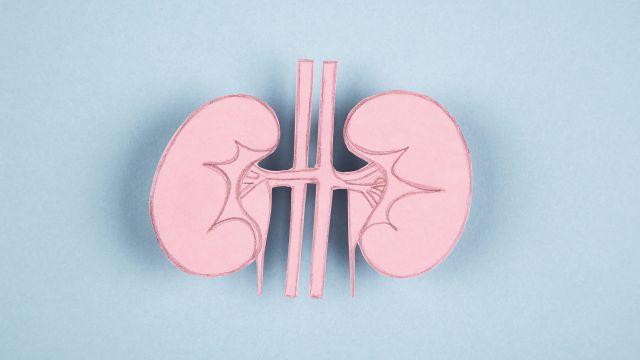Updated on November 12, 2024
The kidneys are a pair of organs located on either side of the spine, just below the rib cage. They remove waste and excess fluid from the blood, so it can be expelled in urine. They also help regulate blood pressure and make a hormone that the body needs to produce red blood cells. This makes the kidneys two of the most important organs in the body.
Diabetes is a chronic condition where the body cannot make enough insulin or effectively use the insulin it does make. Insulin is a hormone the body requires in order to use blood sugar (glucose), one of its primary sources of energy.
Diabetes can damage the kidneys and cause them to stop working correctly. While not everyone with diabetes will end up with kidney disease, the risk is certainly higher. Roughly 1 in 3 people with diabetes also have kidney disease.
Below are some key terms and phrases to help you understand the kidneys. Knowing them can be helpful when you're learning how type 2 diabetes can affect the health of the kidneys.
Albumin: A protein made by the liver that helps carry nutrients throughout your body, maintain fluid levels, and keep you healthy
Albumin/creatinine ratio: A method of detecting elevated protein levels
Chronic kidney disease (CKD): Occurs when your kidneys are damaged to the point where they can no longer filter blood properly
Creatinine: Waste created by your muscles and filtered by your kidneys
Diabetic kidney disease: A type of chronic kidney disease that’s caused by diabetes
Dialysis: A procedure to remove waste from the body when the kidneys no longer function properly
End-stage renal disease (ESRD): The last stage of kidney disease in which your kidneys stop working, usually requiring long-term dialysis or a kidney transplant
Erythropoietin: A hormone produced by the kidneys that helps make red blood cells
Glomerular filtration rate (GFR): A blood test to see how well your kidneys are working
Glomeruli: Blood vessels in the kidneys that filter blood to create urine
Hypertension: A condition marked by increased resistance to blood flow in the arteries. As a consequence, your heart has to pump harder to circulate blood, which results in high blood pressure or hypertension. People with diabetes are more likely to have high blood pressure.
Kidney failure: Another term for ESRD
Nephrons: The filtering units that make up the structure of the kidneys
Nephropathy: Deterioration of the kidneys and kidney function due to kidney disease, often caused by hypertension in people with diabetes
Renal: A term that refers to the kidneys
Renal failure: Another term for kidney failure
Urine albumin test: When the kidneys stop working properly, proteins can leak from your kidneys into your urine. This test looks for albumin (blood protein) in your urine to detect signs of kidney damage.
Vitamin D: A hormone created in the kidneys that helps the body absorb calcium and phosphorus, both of which are important to bone health
If you have diabetes, it is important to work closely with a healthcare provider (HCP). Taking steps like controlling your blood sugar levels—as well as monitoring your blood pressure and cholesterol—can help keep your kidneys as healthy as possible. These steps can also reduce other complications, such as cardiovascular problems.
Remember that your HCP will be your best source of information for treating diabetes and kidney problems. Talk to your HCP about your treatment options. There are several medications for people who have diabetes that can help protect the health of the kidneys and the heart.






